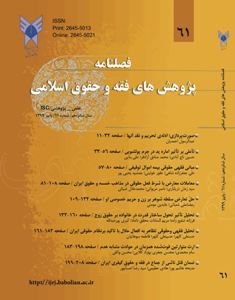حلّ تعارض سلطه شوهر بر زن و حریم خصوصی او
محورهای موضوعی : حقوق خصوصیرمضانعلی شعبانی 1 , عابدین مومنی 2 *
1 - دانش آموخته فقه و مبانی حقوق اسلامی، واحد بابل، دانشگاه آزاد اسلامی، بابل، ایران
2 - دانشیار فقه و مبانی حقوق اسلامی دانشگاه تهران، تهران، ایران
کلید واژه: تعارض, زوجین, سلطه, حکومت, حریم خصوصی,
چکیده مقاله :
در زندگیِ عرفی، بر اساس بعضی آراء فقهی این تصوّر برای مسلمانان پدید آمد که در زندگی اجتماعی، عملاً رویه زندگی خانواده بر اساس سلطه مطلق شوهر بر همسر قرار گرفته است. از طرف دیگر بر اساس باز پژوهی مستندات فقهی و مبانی رابطه زن و شوهر با یکدیگر و پذیرفتن مالکیّت خصوصی، استقلال هر یک از زن و شوهر نسبت به هم از نظر جان، مال و آبرو در زندگی زناشویی رجحان داشته و سلطه شوهر در حدّ حقّ زوجیّت یعنی تمکین و حسن معاشرت می باشد و در مقابل، زن هم از بابت دریافت مهر و نفقه بر شوهر سلطه دارد که سلطه ای متقابل و عادلانه است و برابری زن و شوهر را اثبات می کند. با این اوصاف این دو تصوّر یعنی تسلّط زوج و حریم خصوصی زوجه در تعارض با هم قرار می گیرند. حال راه حلّ چیست؟ آیا با وجود ادلّه فقهی تسلّط زوج بر زوجه، می توان برای زن حریم خصوصی قائل شد؟ از آن جایی که تعارض، جنبه بدوی دارد می توان از طریق جمع عرفی و از باب حکومت آن را حل نمود. با این بیان که با توجّه به اصل عدم ولایت و این که هر انسانی در جان و مال و آبرو استقلال دارد، حریم خصوصی زوجه بر آن حاکم بوده و آن را محدود می کند.
In ordinary life, according to some jurisprudential views, the idea arose for Muslims that in social life, the practice of family life is practically based on the absolute domination of the husband over the wife. On the other hand, based on the re-examination of jurisprudential documents and the principles of the relationship between husband and wife, and by accepting private property; the independence of each spouse is preferable to each other in terms of life, property and honor in married life. Therefore, the domination of the husband is to the extent of the right of marriage; that is, obedience and good companionship. On the other hand, the wife dominates the husband in terms of receiving dowry and alimony, which is a reciprocal and just domination, thus proving the equality of the husband and wife. With this description, the two notions of husband domination and wife privacy are in conflict. What is the solution? Is it possible to give privacy to a woman, despite the jurisprudential arguments for the husband to dominate the wife? Since the conflict has a primitive aspect, it can be resolved through customary collecting and through Hukoma (supremacy). According to the principle of non-guardianship every human being has independence in life, property, honor, the privacy of the wife rules and limits it.
_||_
Bahr al-Uloom, M. (1983). Balgha al-Faqih. Tehran: Sadiq School.
Bayhaqi, A. (1957). Taj Al-Masader. Tehran: Hadi Alamzadeh.
Darabi Kashefi, J. (2006). The gift of the kings. Qom: Bustan Kitab Institute.
Fahim Kermani, M. (2008). The face of a woman in the mirror of jurisprudence. Qom: Seyyed al-Shohada Publication.
Farahidi, Kh. (1988). Kitab al-Ain. Qom: Hijrat Publication.
Ghorbannia, N. (2011). Human rights and humanitarian rights. Tehran: Institute of Islamic Culture and Thought.
Helli, H. (1993H). Tazkerat al-Fiqh. Qom: Al-Bayt Institute.
Hur Ameli, M. (1988). Shiite means. Qom: Al-Bayt Institute.
Ibn Babawiy, M. (1983). Al-Khasal. Qom: Society of Teachers.
Ibn Faris, A. (1984). Dictionary of comparisons of language. Qom: Islamic Media School.
Jabaei Ameli , Z. (1992). Problems of understanding to refute the laws of Islam. Qom: Islamic Enlightenment Foundation.
Jafarian, R. (2007).Treatises on Hijab. Qom: Qom Publication.
Makarem Shirazi, N. (2007). Women's rulings. Qom: Imam Ali Ibn Abi Talib School Publication.
Mohaghegh Damad, M. (1985). Rules of jurisprudence. Tehran: Islamic Sciences Publishing Center.
Motahari, M. (1995). The system of women's rights in Islam. Tehran: Sadra Publication.
Mousavi Golpayegani, M. R. (1988). Majma 'al-Masa'il. Qom: Dar al-Quran al-Karim.
Mousavi, R. (1989). Sahifa Imam (Sahifa Noor). Tehran: Institute for Organizing and Publishing the Works of Imam Khomeini.
Najafi, M. H. (1984). Jawahar al-Kalam fi Sharh Sharia. Beirut: Dar Al-Ihyaa Al-Tarath Al-Arabi
Qaroubi Tabrizi, H. (2004). Al-Nadhid Fi Sharh Rawdah Al-Bahiyya. Qom: Davari Publications.
Rahmani, A. (2012). Jurisprudential study of management in marital relations. Qom: Research Institute of Islamic Sciences and Culture.
Sabzevari, M. (n.d). Kefayeh al-Ahkam. Isfahan: Mahdavi Publishing.
Safaei, H. & Emami, A. (2007). Brief family law. Tehran: Tehran Publication.
Sahib Ibn Abbad, E. (1993). The environment in the language. Beirut: World of Books.
Shams, M. (1966). Issues of freedom in the jurisprudence of women, marital rights. Beirut: State Institute for Studies and Publishing.
Sistani, A. (1996). Minhaj Al-Saleheen. Qom: the office of Hazrat Ayatollah Sistani.
Tabatabai Yazdi, M. K. (1998). Fiqh of Hadith Issues. Beirut: Dar al-Azwa.
Tabatabai, M. H. (1996). Al-Mizan Fi Tafsir al-Quran. Qom: Islamic Publications Office of the Qom Seminary Teachers Association.
Tusi, A. (1993). Al-Amali. Qom: Dar al-Thaqafa.
Zoheyli, M. (2011). Human rights in Islam. Beirut: Dar Ibn Kathir.

